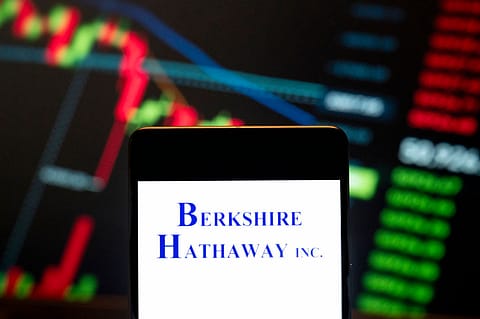Greg Abel's trial by fire: Allocating Berkshire's $347-bn cash pile
Buffett’s successor has a tough job at hand allocating capital in a high interest rate and uncertain geopolitical environment

As the 94-year-old Warren Buffett prepares to step down as CEO of Berkshire Hathaway at the end of the year, the spotlight turns to Greg Abel, his 62-year-old designated successor. Abel, set to take the helm pending board approval, inherits a company at a historic inflection point—one flush with a record $347.7 billion cash pile as of Q1 2025.
This war chest represents both an extraordinary opportunity and a formidable challenge. Buffett, the legendary "Oracle of Omaha," has made it clear this hoard wasn’t amassed to ease Abel’s transition. “I wouldn’t do anything nearly so noble as to withhold investing myself just so that Greg couldn’t look good later on,” Buffett told CNBC in an interview. Instead, the cash reflects a deliberate strategy: waiting for the right opportunities in an unpredictable world.
Abel’s task is enviable—few CEOs command such a vast pool of deployable capital—but it’s also daunting. Berkshire’s stock, which has outpaced the S&P 500 over the past 20 years at 11.9% versus 10.3% for the S&P 500, thrives on book value appreciation rather than dividends. Capital allocation, as Buffett has long emphasised, is the lynchpin of this growth. With Berkshire generating roughly $40 billion in cash annually and a cash pile that’s 27% of its total assets against a 25-year average of 13%—Abel must deploy this capital at rates that at least match the index’s 12% annualised return over the past decade. Anything less risks stalling Berkshire’s outperformance.
Yet, Abel steps into this role with a proven track record. According to Curonian Research, an investment and finance blog, Abel has already demonstrated exceptional skill in capital allocation. Since joining Berkshire 25 years ago via the acquisition of MidAmerican Energy, Abel rose to CEO of what is now Berkshire Hathaway Energy (BHE) by 2008. Under his leadership, BHE has tripled its earnings, becoming the conglomerate’s fastest-growing division organically. His $16 billion in acquisitions—including the $5.6 billion NV Energy deal and the $4 billion Dominion midstream assets purchase, each with enterprise values around $10 billion—underscore his ability to execute large-scale investments effectively.
The numbers speak louder still. From 2010 to 2022, the railroads and energy division, which Abel oversees, added $53 billion in equity while boosting earnings by $7 billion—a 13% average return on new equity investments. This matches the S&P 500’s benchmark during a low-interest-rate environment, a feat Curonian deems “quite impressive” given the scale of capital deployed.
Interestingly, according to data crunching by Morningstar for the Financial Times, from 2014 to 2022, Abel outperformed Berkshire’s other portfolio managers, Ted Weschler and Todd Combs, who achieved 10.6% annualised returns, and even Buffett himself, whose stock picks aligned with mid-teen returns. Abel’s $39 billion equity infusion into BHE during this period and $5 billion earnings increase helped him generate a 13% marginal rate of return that outshone his peers, including Buffett.
Not surprising Buffett’s confidence in Abel is palpable. “I think the prospects of Berkshire will be better under Greg’s management than mine,” he declared at the annual meeting, adding he hopes Abel is “still running things” 50 years from now. But Buffett’s refusal to deploy the cash pile aggressively—despite coming close to a $10 billion deal recently—sets a high bar. “If you told me I had to invest $50 billion every year until we got down to $50 billion, that would be the dumbest thing in the world,” Buffett said. “Things get extraordinarily attractive very occasionally.” Abel must now navigate this philosophy: maintaining a fortress balance sheet while seizing rare, high-value opportunities.
Recommended Stories
In fact, David Rubin, a Berkshire shareholder, aptly summed up in his question to Abel that, “In the first 10 years as CEO, Abel will be tasked with allocating more capital than Berkshire has had to allocate in its history…” And in reply to Rubin’s query, Abel’s response seemed to align closely with Buffett’s 60-year playbook. “Whether it’s 100% or 2% of a company, we must thoroughly understand its economic prospects—five, ten, or twenty years out—and the underlying risks,” Abel said. His hands-on style—fostering collaboration among managers—complements this disciplined strategy.
The stakes are immense. Berkshire’s $10 billion annual increase in insurance float over the past three years, driven by Ajit Jain, offers a financing advantage that has historically boosted book value growth beyond market returns. If Abel sustains his 13% return on capital, this leverage could push Berkshire’s growth even higher. Yet, tariff uncertainties and a $267 billion equity portfolio add complexity. However, over the past 12 months, the Berkshire stock has significantly outperformed S&P 500, delivering 33% return compared to 10% by the S&P 500.
Buffett’s parting gift isn’t a simple handoff—it’s a test of Abel’s mettle, one he’s well-equipped to face—if his past is any guide. But, as the old Chinese curse goes, Abel is about to find himself living in interesting times.